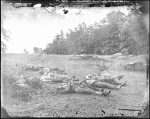



OBERLIN
COLLEGE Department of History |
|
| Gary J. Kornblith | History
103 |
| Rice 306; x8526 | Fall 2002 |
| Email: gary.kornblith@oberlin.edu | Office hours:
Mon., 1:30 -3:30 p.m. and by appointment |
|
American History to 1877: |
 |
 |
 |
 |
The up-to-date, official syllabus for this course is maintained online at http://www.oberlin.edu/history/GJK/H103F02/.
This course provides an introduction to the study of American history from the eve of European colonization through the close of Reconstruction. It is not a conventional survey, however. Rather than try to address all the significant historical developments that took place across four centuries, we focus on a few key topics which hold special interest for scholars and which figure centrally in debates over the meaning of the American experience today. By sacrificing"coverage" for in-depth analysis, we are able to pay particular attention to how historians do history and construct interpretations from various kinds of evidence. We also consider how historians try to compensate for the lack of surviving sources by non-literate peoples and about certain subjects, and why historians sometimes disagree about how to read and evaluate the sources that do exist. Historical interpretation is "contested terrain." Yet it is not simply a matter of opinion where all points of view are equally valid. Historical interpretation involves creative investigation, careful documentation, critical thinking, and logical analysis. Over the course of the semester, students will be expected to develop and to explain their own interpretations regarding a host of major issues in the study of American history to 1877. Format: Most weeks there will be lectures on Mondays and Fridays and discussions on Wednesdays. The discussions will focus on the assigned readings, which should be done on time. In preparation for class discussions, students will be required to post responses to one or more study questions on Blackboard. Note also that attendance at discussion sessions is required and that student participation is expected. Evaluation: Students will be evaluated on the basis of two position papers (25% each); class participation, including contributions to Blackboard (15%); and a final paper (35%). The instructor reserves the right to exercise some discretion in assigning final grades. All student work is governed by the Oberlin College Honor Code. If you have a question about how the Code applies to a particular assignment, you should raise that question with the professor in advance of the due date. Purchases: The following materials are available at the Oberlin Bookstore and should be purchased. Most are also on reserve in Mudd.
Online resources: This course will make use of a variety of electronic resources online, including Blackboard, ERes, and JSTOR. The instructor will explain how to use these resources as the need arises. Schedule
of classes and assignments: |
| Wed., Sept. 4
|
Introduction | |
| Collision of Cultures | Fri., Sept. 6 | Native America at 1490
|
 Bartholome de Las Casas, Narratio regionum indicarum per Hispanos...(1598). Source: Special Collections, University of Pennsylvania Library |
Mon., Sept. 9
|
Emergence of the Atlantic World |
| Wed., Sept. 11 | Discussion: Ecological Dimensions of Conquest
|
|
|
Fri., Sept. 13
|
Spanish Colonization of North America
|
|
| Mon., Sept. 16
|
No class: Yom Kippur | |
| Wed., Sept. 18 | Discussion: Motives for English Colonization
|
|
| Fri., Sept. 20 | Early Virginia |
|
|
Mon., Sept. 23
|
Early New England |
|
Wed., Sept. 25
|
Discussion: Early English-Native Encounters
|
|
| Origins of American Racism | Fri., Sept. 27 |
Colonies
in Crisis
|
| Mon., Sept. 30 | Rise of the Atlantic Slave Trade |
|
 "The Virginia Planters Best Tobacco" Colonial Williamsburg website |
Wed., Oct. 2 | Discussion: Slavery, Racism, and the Problem of Causation
|
| Constructing the American Nation-State | Fri., Oct. 4 | Constructing the British Empire
|
 Paul Revere, The Bloody Massacre perpetrated in King Street (1770) |
Mon., Oct. 7 | Imperial Crisis and Dynamics of Resistance First paper due |
| Wed., Oct. 9 | Discussion: Reasons for Rebellion
|
|
| Fri., Oct. 11 | How Radical Was the American Revolution?
|
|
 James Madison |
Mon., Oct. 14 | Designing a Federal Republic
|
| Wed., Oct. 16 | Discussion: The Debate over the Federal Constitution
|
|
| Fri., Oct. 18 | Partisan
Conflict in the 1790s |
|
Fall
Break |
||
| Market Revolution and Sectional Divergence | Mon., Oct. 28 | Dynamics of Economic Growth, 1790-1850
|
 Illustration in Robert H. Thurston, A History of the Growth of the Steam-Engine (1878) Source: Steam Engine Library |
Wed., Oct. 30 | Discussion: The Relationship between Republican Values and Capitalist Development
|
| Fri., Nov. 1 | Indian Removal and the Expansion of Slavery |
|

|
Mon., Nov. 4 | Class, Race, and Gender in the Antebellum North
|
| Wed., Nov. 6 | Discussion: What Did Antebellum Northern Women Want?
|
|
| Fri., Nov. 8 | Class, Race, and Gender in the "Old South"
|
|
| Democratization and the Politics of Slavery | Mon., Nov. 11 | Slave Culture and Resistance |
 John Greenleaf Whittier, "Our Countrymen in Chains" Source: Library of Congress |
Wed., Nov. 13 | Discussion: Interpreting the Slave Experience
|
| Fri., Nov. 15 | The Jacksonian Party System
|
|
| Mon., Nov. 18 | The Abolitionist Movement
|
|
 Oberlin in the 1850s |
Wed., Nov. 20 | Discussion: The Perfectionist Vision of Early Oberlin
|
| Fri., Nov. 22 | Manifest Destiny and War with Mexico
|
|
| Mon., Nov. 25 | Collapse of the Jacksonian Party System | |
| Wed., Nov. 27 | Discussion: Sources and Dynamics of Sectional Conflict
|
|
| Fri., Nov. 29 | No class: Thanksgiving | |
 Abraham Lincoln |
Mon., Dec. 2 | From Sectional Crisis to Secession
|
| Wed., Dec. 4 | Discussion: Was the Civil War Inevitable?
|
|
| Reconstructing the American Nation-State | Fri., Dec. 6 | Civil War and Emancipation
|
 Contrabands. Library of Congress. |
Mon., Dec. 9 | Reconstruction
|
| Wed., Dec. 11 | Discussion: Consequences of the Civil War
|
|
| Fri., Dec. 13 | Retreat from Reconstruction |
|
| Tues., Dec. 17 | Final paper due at 11 a.m. | |